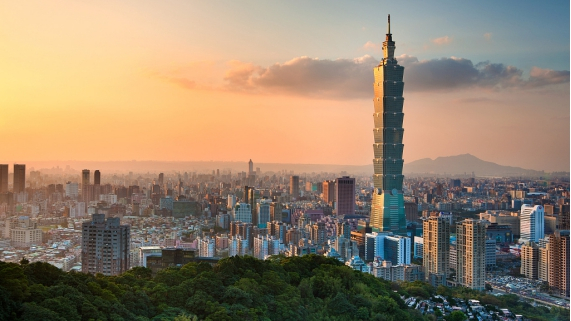
The Taipei 101 skyscraper, China's Taiwan region. /VCG
The Taipei 101 skyscraper, China's Taiwan region. /VCG
Editor's note: Zhang Hua is an expert at the Institute of Taiwan Studies under the Chinese Academy of Social Sciences. The article reflects the author's opinions and not necessarily the views of CGTN.
The United States has adopted the so-called "Taiwan Allies International Protection and Enhancement Initiative Act" or "TAIPEI" in a bid to help Taiwan maintain "diplomatic relations" with a number of countries and advocate for Taiwan's participation in some international organizations.
The U.S support to Taiwan, which comes amid a strategic competition with China, cannot help Taiwan expand its "international space." That, however, did not stop the administration of Tsai Ing-wen from celebrating Washington's move out of political considerations on the island.
The text of the act teems with vague terms, showing that the United States is not serious about helping Taiwan. The most important provisions of the act are Section 4 and Section 5. Section 4 is about the United States supporting Taiwan's participation in international organizations. However, according to the text, the U.S. only supports Taiwan "as appropriate" or "in certain cases as appropriate." There is no explanation on what "in certain cases as appropriate" actually means.
Section 5 is about the United States supporting Taiwan in maintaining "diplomatic relationships" with a certain number of countries and aligning the engagement of Taiwan and America with such countries – something that Taiwan authorities highly value. However, this is only the "sense of Congress" and is not legally binding. Like Section 4, it is full of qualifiers such as "in alignment with United States interests" and "in alignment with United States foreign policy interests.
Second, the enforcement of the act is subject to great discretion of the U.S. administration. After the establishment of diplomatic relations between China and the United States, no less than a hundred bills related to Taiwan have been passed by the U.S. Congress, but the enforcement is patchy. For example, in 2018, the U.S. enacted the so-called "Taiwan Travel Act," calling for the U.S. administration to upgrade its level of engagement with the Taiwan authorities and allowing high-level U.S. officials to visit Taiwan.
However, more than two years later, the Trump administration has yet to send ministerial-level officials to visit Taiwan, even though several U.S. secretaries visited Taiwan before the law was enacted (such as the 2014 visit of then Administrator of the Environmental Protection Agency Gina McCarthy to Taiwan). Therefore, even though the law has entered into force and is followed by the U.S. administration, to what extent the executive branch enforces the law and its final impact remain up in the air.

Night view of Taipei, China's Taiwan region, June 20, 2019. /Xinhua
Night view of Taipei, China's Taiwan region, June 20, 2019. /Xinhua
Third, the U.S. has a bad track record of supporting Taiwan's "greater international participation." Since 2001, the Congress has passed bills supporting Taiwan's participation in international organizations almost every year. For example, H.R.428, passed in 2001 to support Taiwan's participation in the World Health Organization (WHO), and H.R.1151, passed in 2013 to support Taiwan's participation in the International Civil Aviation Organization. Neither had any effect.
Since 2009, Taiwan has participated in the World Health Assembly and the International Civil Aviation Conference. That's not because of U.S. support, but because the then Taiwan administration recognized the "1992 Consensus" and consulted with Beijing for a seat. After 2016, although the United States still passed similar bills, such as S.2426 in 2016, which supported Taiwan's participation in the International Criminal Police Organization, Taiwan was not eligible for joining any international organization.
Last but not least, considering the response of the Chinese mainland, the "international space" of Taiwan may be further limited. An important part of Beijing's Taiwan policy is its opposition to foreign intervention. After the United States passed the so-called "TAIPEI," both the Taiwan Affairs Office of the State Council and the Ministry of Foreign Affairs expressed opposition. To be sure, despite the U.S. endorsement through "TAIPEI," Taiwan is unlikely to participate in the upcoming World Health Assembly in May, nor can it secure a seat in any international organization under the UN system. On the contrary, after losing "diplomatic ties" with seven countries, the Tsai administration is likely to lose several more.
Therefore, "TAIPEI" is merely a show prepared by the U.S. for Taiwan, giving residents a false sense of hope. In fact, the Tsai administration is keenly aware of all of this. The main reason for her tangoing with the U.S. and even expressing gratitude to the U.S. is that she needs to preserve her partisan interests on the island. Actually, cross-Strait relations are more fundamental to Taiwan's security and interests.
However, the refusal of the Tsai administration to recognize the "1992 Consensus" and the rising tension in cross-Strait relations have rattled the nerves of the people of Taiwan. Knowing the chance of winning the tug-of-war with Beijing is slim, the Tsai administration is scrambling to create an illusion where the U.S. stands behind Taiwan so as to ease concern among residents of the island.
It is impossible for the people on the island to dig deep into the provisions of the act, so they might easily be fooled by Tsai's political propaganda. In the meantime, the Tsai administration has stepped up cooperation with the U.S. Indo-Pacific Strategy and even provided assistance to the U.S. in fighting COVID-19. Conveniently, the act was cited as returning the favor from the U.S. in "good faith." It set the stage for the Tsai administration to get closer to the United States.
(If you want to contribute and have specific expertise, please contact us at opinions@cgtn.com.)